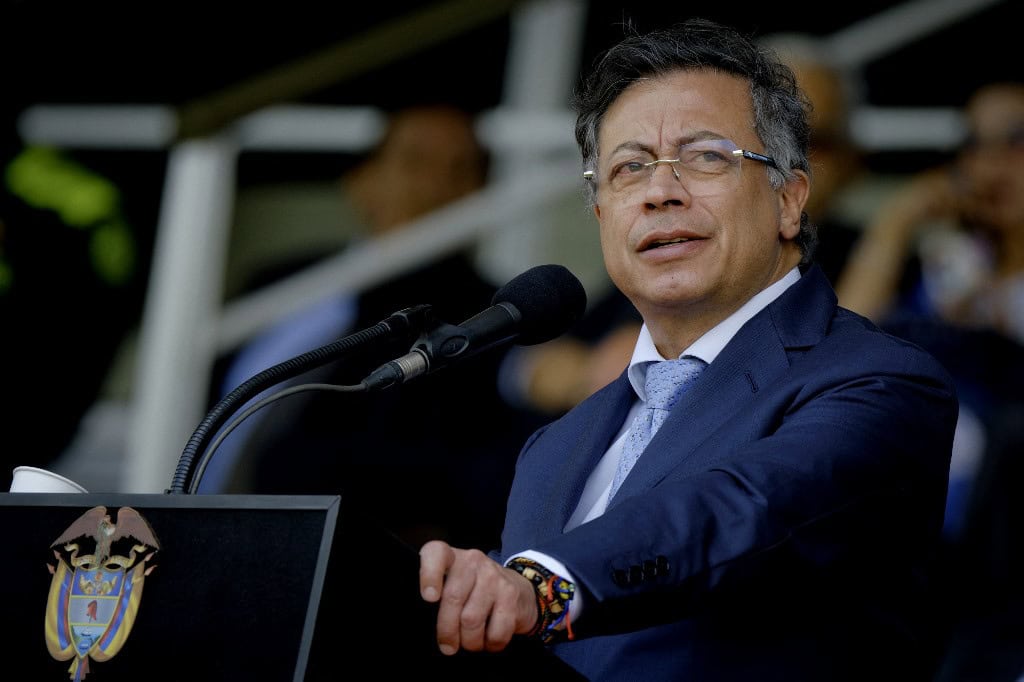The United States announced on Friday financial sanctions against Colombian President Gustavo Petro for failing to combat drug trafficking, drawing a strong response from the president, who vowed he would not take “a single step back.”
The U.S. Treasury Department also imposed sanctions on the leftist leader’s wife and one of his sons, as well as on Interior Minister Armando Benedetti, his right-hand man. It was an unusual move. The U.S. sanctions list is usually reserved for drug kingpins, terrorists, and dictators implicated in serious human rights abuses.
The decision came the same day the United States announced the deployment of an aircraft carrier and its escort fleet to join the military offensive that has operated since August to “counter narco-terrorism” in Latin America.
It is the first time a president of Colombia, the world’s largest producer of cocaine, has received such a sanction. “President Petro has allowed drug cartels to thrive and has refused to stop this activity,” U.S. Treasury Secretary Scott Bessent said in a statement.
Trump “is taking strong measures to protect” his nation, he added. Petro reacted with harsh words: “Fighting drug trafficking for decades and effectively brings me this measure from the government of the society we helped so much to curb their cocaine consumption.”
“Quite a paradox, but not one step back and never on our knees,” he added. Petro argues that Trump’s advisers are close to drug traffickers and claims cocaine kingpins live comfortably in U.S. cities like Miami.
The Colombian leader also rejects Washington’s strikes on alleged drug-running boats in the Caribbean and the Pacific, which to date have left at least 43 dead, which he calls “extrajudicial executions.”
Gringos go home
The measures, published by the Office of Foreign Assets Control (OFAC), entail blocking any property the sanctioned individuals hold in the United States and restricting international transactions using U.S. payment systems.
Without providing evidence, Trump accused Petro of being a “drug-trafficking leader” and announced an end to economic aid to Colombia in retaliation for the country’s high level of drug production. At Petro’s call days ago, hundreds of demonstrators gathered Friday in Bogotá with messages such as “Trump, respect Colombia.”
The sanctions also involve the president’s wife, Verónica Alcocer, and his eldest son, Nicolás Petro, who is in a criminal trial for allegedly receiving about $100,000 for his father’s 2022 campaign from a former drug trafficker once imprisoned in the United States.
The president’s son says the money did not reach the campaign’s finances. Benedetti, the official closest to Petro and one of his biggest allies during the presidential race, was also sanctioned. Benedetti, former ambassador to Venezuela and to the FAO in Rome, referred to the United States as an “unjust” “empire,” whose anti-drug fight is “an arms-driven farce.”
“For the United States a non-violent statement equals being a drug trafficker. Gringos go home,” added the Interior Minister.
Smear campaign
In his youth, Petro belonged to an urban guerrilla group, the M-19, which laid down its arms in a 1990 peace process. In its statement, the Treasury Department recalled his past as a rebel and claimed he has “allied” himself with the “narco-terrorist regime” of Venezuelan President Nicolás Maduro.
It also criticized him for granting “benefits” to criminal organizations in Colombia through his policy of negotiating to achieve peace.
Colombia’s ambassador in Washington, Daniel García-Peña, said in an AFP interview this week that there is a “great distance” between Petro and U.S. Secretary of State Marco Rubio, a well-known foe of the Latin American left.
For the Colombian president, Republican senators close to Colombia’s right wing, such as Bernie Moreno, are behind a smear strategy against Colombia. “Indeed, Bernie Moreno’s threat was fulfilled,” he added in his response to the sanctions.






